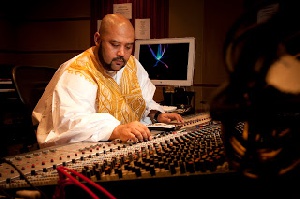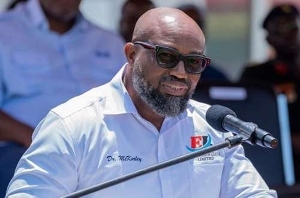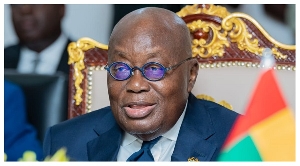- Home - Entertainment
- Lifestyle News
- Entertainment Videos | TV
- Year In Review
- Music News
- Entertainers
- Entertainment Archive
- Entertainment Photos
- Jokes
- Entertainment Headlines
- Ameyaw Debrah
- Brown GH
- Celebrities Buzz
- GH Base
- Ghana Celebrities
- Gh Gossip
- GH Page
- GH Splash
- Hot Gossip GH
- YEN

Entertainment of Sunday, 19 April 2015
Source: Daily Guide
Coptic: Hip Hop’s super-producer
Ghanaian-born, New York-based Eric ‘Coptic’ Matlock has worked with the biggest names in hip hop. He’s been in the studio, and made music for the likes of the late, great, Notorious BIG, Black Rob, P Diddy, Jermaine Dupri, just to name a few. But he takes pride in working with Ghanaian artistes like Kwaw Kese, D Black, Trigmatic and a host of stars Ghana has produced, on a mission to break the barriers and sell our music internationally.
The passion and drive Coptic has for Ghanaian music to break new grounds is unparalleled. He relentlessly continues to make great music for our artistes and pushes them to take music as a business, and not just an art. One thing is certain; we need more Coptics in our industry. I caught up with him to learn more.
What have you been up to recently?
Coptic: To tell you the truth, I’ve been trying to enjoy the fruits of my labour, from working so many years in the American music industry. I’ve been taking it a bit easy, still producing records here and there, as I choose.
I’m not really actively searching for work as I used to when I was younger. I’m also starting my record label in Ghana. I’ve already signed a couple of artistes. I’m looking to retire from the States soon, move to Ghana, and live out my future over there.
How big is Ghanaian music over in the States?
Coptic: Well, there are some radio stations and places where you can hear Ghanaian music. You know there are Ghanaians everywhere, man, and we love music so we take it with us where ever we go. But that’s really as far as our music goes.
It doesn’t get past the Ghanaians that are here. Ghanaians will listen to our traditional music, or hip hop, etc, for sure. But in the American sense, I don’t even think they know it exists. They don’t really identify with Ghana music. Our music is not that big here at all, and that’s unfortunate, because it could be.
What are some of the most memorable moments of your career?
Coptic: It has to be when I was first starting and I finally got accepted by my peers. I was this kid from Africa, who didn’t know much about hip hop. The first hip hop record I ever heard was ‘You Gotta Have Soul’ by Eric B. & Rakim.
That’s the record that put me on to hip hop. I became a DJ for many years before I started producing. Being a producer when I was starting was a special thing and I used to get laughed at.
I had people tell me that I had to “pay my dues”. Nowadays, there’s no such thing. You can make one record and it can become popular the next day. Part of “paying my dues” was getting ridiculed by my peers, because they thought my music was not up to par.
One of the biggest moments was when I got the confirmation that my music was ready, by somebody I really looked up to. It took a big load off my chest. It validated what I had been doing for almost three years, every day making beats, sleeping in studios.
It was not over just because he confirmed it, I still had to do that, but the fact that he thought I was ready was a big moment for me. The guy who gave me the green-light is currently the president of Bad Boy Worldwide. Other moments include hanging out with Biggie Smalls and coming out of my house and hearing my song played on radio for the first time.
What do you enjoy the most about what you do?
Coptic: The unpredictability about it is what I love the most. When I get a beat in my head, 99% of the time I do it instantly. It’s all about the creativity. I love it when I am alone in the studio making beats. Also, I love it when I give a beat to the artiste, and he comes back with the right vocals. I recently did a beat that I thought was perfect for M.anifest. I sent it to him, he did it and sent it back. It’s called ‘Keep Shining’. He killed it. That’s what all it’s all about.
What are some of the problems you’ve noticed in the Ghanaian music scene, and how would you fix them?
Coptic: Well, first of all there are problems in every type of business that you do. There are obviously many issues. I’m looking at comparing it to here in the States. Over here, your rights are protected.
Nobody would even dare to steal your stuff. Some try to, but you are very well protected. I think that’s the main issue in Ghana. Artistes and producers are not properly protected.
That’s the bottom line. Your money needs to be protected. How can it be fixed? Who knows? It’s part of a culture, and the way business has been done for so many years. It’s deeply entrenched. It has to be a political solution, where people in power, can scare these rich people into respecting the artist. You simply cannot have an artiste, whose music plays constantly on the radio, not be rich. That’s just crazy. There’s no way that can happen over here.
You’ve worked with a lot of big names. Who was your favourite to work with?
Coptic: I like working with Diddy because he knows what he wants. I loved working with Biggie too. Big was the man. I remember when I was with him in the studio and he convinced me to drop a verse. (laughs)
What would you say makes a good producer?
Coptic: Well, you know there is a producer, a beat maker, and a guy who does it all. I do it all. I can make the beat, and engineer as well. I can help arrange the song, help you elevate the song; suggest harmonies, basically whatever you need. We can create the record from scratch. That’s what a producer does. Just making the beat doesn’t make you a producer.
What are your thoughts on GH producers?
Coptic: There are quite a few dope producers in Ghana. They just don’t have the outlet. They need that platform to shine and come across here in the States. People like Jayso, King of Accra, Jules, etc, could really blow up out here if they had the outlet.
What’s next for you?
Coptic: I’m focusing on raising my daughters out here. I’m a family man. I’m trying to set the record straight so I can spend some time on myself out there in Ghana. I’m only working on music that I love, as well as rolling out my record label in Ghana.
A message for your fans?
Coptic: I don’t really know how many fans I got. I’m a laid back kinda dude, who doesn’t really like the spotlight. But for any fans I do have, I appreciate you being a fan. For my people in Ghana, I will continue to highlight GH artistes and promote our music out here in the States. Look out for my artistes, J.O.E.L and Trey LA. Peace!











